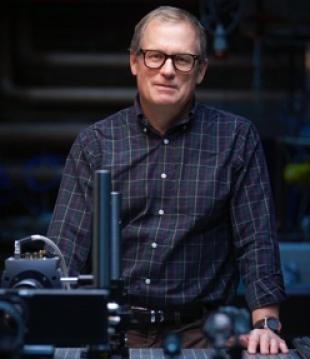Location:
Lecture Theater 1, Sanderson Building, School of Engineering, King's Buildings
Date:
High-efficiency combustion modes for future transportation power trains will all use direct injection of fuel into the combustion chamber. Fuel/air mixture preparation thus controls the success or failure of these new modes, and it dominates the formation and removal of pollutants. For this reason, the way in which the fuel spray prepares a spatially and temporally varying fuel vapour/air mixture, and the way it interacts with the gas-phase flow inside the combustion chamber, are critical for next generation engines. Until recently very little was known about how the spray creates this mixture. It has become clear, for example, that the flow inside a fuel injector has a significant effect on the early stages of spray formation. The process by which the liquid stream that has exited the injector breaks up has yet to be fully characterized as well. This process of spray formation controls the subsequent spray development (droplet breakup, vaporization, and mixing) and overall mixture formation. It also controls the dynamics of turbulence generation, which is critical for rapid flame propagation. A major goal of this work, therefore, is to develop much better understanding of the mechanisms controlling in the early processes. Another goal is to support the development of predictive models for spray formation. This component of the overall problem is currently one of the weakest links in the development of predictive models for combustion inside such devices. This seminar will include a description of new experimental approaches to the spray formation problem and what has been learned so far. Examples related to Diesel engine sprays will be provided. A large and more basic program (experimental and theoretical) aimed at development of computationally efficient but predictive models for spray formation will also be described.
Biography
Mark Linne earned a PhD in Mechanical Engineering at Stanford University in 1985. His thesis dealt with the chemical kinetics of a gas-phase technique for scrubbing NOx from power plant stacks (Thermal DeNOx) and that involved development of new laser diagnostics for the important reactive intermediates. After graduation he developed new laser sources at Spectra-Physics Inc. (developing the first commercially available Q-switched diode pumped solid state lasers). Linne then became a professor at the Colorado School of Mines where he focused on new developments in laser diagnostics (early work on chemical film PIV, cavity ringdown spectroscopy, short pulse degenerate four-wave mixing and pump-probe absorption spectroscopy, fs pulse ballistic imaging, and novel camera architectures). He then moved to the University of Lund in southern Sweden where he focused mostly on gas turbine related combustion problems. In 2006 he became the manager of the Department of Combustion Chemistry at Sandia National Labs, and in 2009 he was named a professor and director of the Combustion Engine Research Centre at Chalmers University in Gothenburg, Sweden. He joined the University of Edinburgh as the Professor of Combustion Engines in 2015. Linne’s main research activities are aimed at development of new laser and x-ray diagnostic techniques to investigate difficult problems that have heretofore not been studied. Linne is a Fellow of the Optical Society of America and most recently he was the elected chair of the 2015 Gordon Research Conference on Laser Diagnostics in Combustion.



